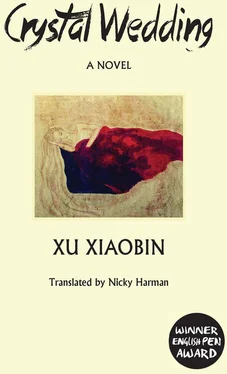Fang was a respected figure within this circle of friends. After dinner, he called just a few of them, including Tianyi, to his room, to talk about Zheng. Everyone was talking about Zheng; all over China, he had become a hero. They were greedy for news, for any titbits of information about him: how was he getting on? What was he doing? Tianyi sensed their eagerness and found herself telling these people every detail of everything she knew, from beginning to end, because she was so anxious for him to get help.
Tianyi was the star of the show that evening. Everyone clustered around her. They seemed especially interested in Zheng’s wife Yiyi’s dramatic performance in court, and Tianyi thought again how in China there was no way of protecting ones secrets. Even those details she regarded as most private had somehow got out. For instance there were rumours that, since Zheng’s imprisonment, Yiyi had been arrested for sleeping with foreigners, that Yiyi had stolen foreign aid funds to buy herself a silver fox coat … But Tianyi had not the slightest interest in this sort of gossip, not only because it might affect Zheng adversely, but also because she found it all too boring. When she thought of Zheng shut away in lonely isolation in that dreadful prison, she felt thoroughly disillusioned at outsiders’ prurient fascination with chewing over his private life. They were as bloodthirsty as the father who fed his son a blood-soaked bun in Lu Xun’s story Medicine ! Of course, they meant well, and Fang had been a huge help to Zheng, as she knew quite well. But even though it showed everyone was interested, it did nothing to raise her spirits.
She was secretly observing Xiao’ou. He was still extremely attractive but seemed in some way to have changed, become even more extrovert. When they used to swim in the reservoir, he seemed to make a point of strutting around in front of her in his swimming briefs, showing off his imposing physique and, especially, his luxuriant growth of chest hair. She had not enjoyed his behaviour. It reminded her uncomfortably of a Mister Universe. Her reaction was to cover up from head to toe, even if she did pour with sweat on a hot day, and to refuse to take off her long-sleeved shirt, thus successfully diverting the men’s gaze to Xi’s body instead.
But no … it was not that Xiao’ou had changed. It was that she had simply not seen him clearly in the past. He was someone who liked to brag about how splendid he would be in a disaster. He might have made a Hermann Hesse, but Mahatma Gandhi or Martin Luther King was clearly beyond him, never mind Jesus Christ. It all made him the polar opposite of Zheng.
She felt now that it was even more difficult to divert their attention from herself than to attract it. It was an art apparently and she was no more than a beginner. For whatever reasons, the feelings she had once had for Xiao’ou, had evaporated. That was probably the only good thing that came out of this trip to Huairou County.
At work, Qiang was looking grimmer by the day. It never occurred to Tianyi that he was not an iron-man but a flesh and blood human being, in the prime of life, strong and vigorous, deprived of his wife and child (they had gone to live abroad), and in a position that gave him few opportunities for diversion. He had two choices: to grit his teeth and curb his desires or spend the midnight hours jerking off compulsively. Never in her wildest dreams did Tianyi imagine that she was the object of his masturbatory fantasies. So by day he scowled furiously at her, as if she had pried into some unspeakable secret of his private life.
Fortunately, Qiang had his decent side; he took pride in being a man of honour and principles, and putting his work responsibilities first. Looking very serious, he entrusted her with inviting three well-known avant-garde authors to the company, to sketch out the plot of a new film. At the same time, he got someone else to do the same with other authors, who wrote rather less highbrow stories.
Of course, Tianyi, who felt she had been wrong-footed over Wusheng, was over the moon. She had dreamed for years of ‘author films’, ever since seeing Alain Resnais’s Last Year in Marienbad , in fact. She longed to get the chance to write the screenplay for a film like that, with its mixture of truth and fantasy. Her intelligence had not yet been tarnished by time, and those three avant-garde authors were not only good friends of hers, they were also very much on the same wavelength.
But creative ideas, as she was discover to her cost, looked quite different once they took practical shape. The authors settled on a thoroughly low-life theme, trafficking in women, for reasons she did not fully understand. As they planned the film, it was as if some sinister presence was manipulating them. Even the utterly matter-of-fact Qiang seemed strangely drawn in. One of the three, Xiang, got to his feet and held forth with gusto. This subject matter would certainly create a stir, he assured them. He was from Henan province, and he told them a whole series of extraordinary stories about Henan women who had been trafficked. His listeners were stupefied.
It was Carl Jung who made the great discovery of the ‘collective unconscious’. On that midsummer evening in 1994, the planning meeting virtually sank into a ‘collective unconscious’. Xiang’s lively performance was totally absorbing. Tianyi did have a vague feeling that all was not right, but her objections were quickly overruled amid the general excitement. And in any case, Qiang was there. As he had complete responsibility for signing up the three authors on behalf of the film company, what was she worrying about?
So she relaxed and watched: Qiang, normally such a dapper figure, unbent so far as to take his shoes and socks off and sit cross-legged. His bare feet gave off a faint whiff and she looked away, secretly annoyed. It was really disrespectful, taking your shoes off in front of a woman! This detail brought her firmly back to the real world and she realized she had missed most of Xiang’s speech.
Xiang’s enthusiasm infected the two other authors, Song and Diao, and Song jumped to his feet and talked about a woman in Sanhe County, his old home, who had been trafficked to Inner Mongolia and sexually abused by the man for five whole years. Finally, she had succeeded in running away and made the long journey home. That got all the men in the meeting very worked up and they launched into a discussion of sexual abuse. It went right back even as far as the Vietnam War, said Diao, when the American troops tortured female captives by piercing their breasts with bamboo spikes, whipping their private parts with belts and so on. There were detailed descriptions of this, he went on, in books such as Letter from the South and South Vietnam Youth in Battle.
From trafficked women to South Vietnam Youth in Battle, the discussion had gone wildly off topic, but Tianyi could not get a word in edgeways. She sneaked a glance at Qiang, who looked impassive but was clearly listening intently. She felt an obscure fury and would have loved to throw a temper tantrum. But she knew quite well that she was not at home and Qiang was not Lian. All she could do was excuse herself, go to the toilet and stand there at the window sighing at the stars.
Tianyi was surprised when she discovered that the three avant-garde authors had taken their fee and gone, just like that. As a result, she came under pressure from Qiang to complete the screenplay herself. She had never in her life written anything on this topic, one which moreover she found abhorrent. But this was the company where she worked and she had to get on with the job. No one had forced her to take up this position. She had to do her duty and she had to write well. And writing well in the context of this company meant that even the cook had to approve.
Читать дальше












